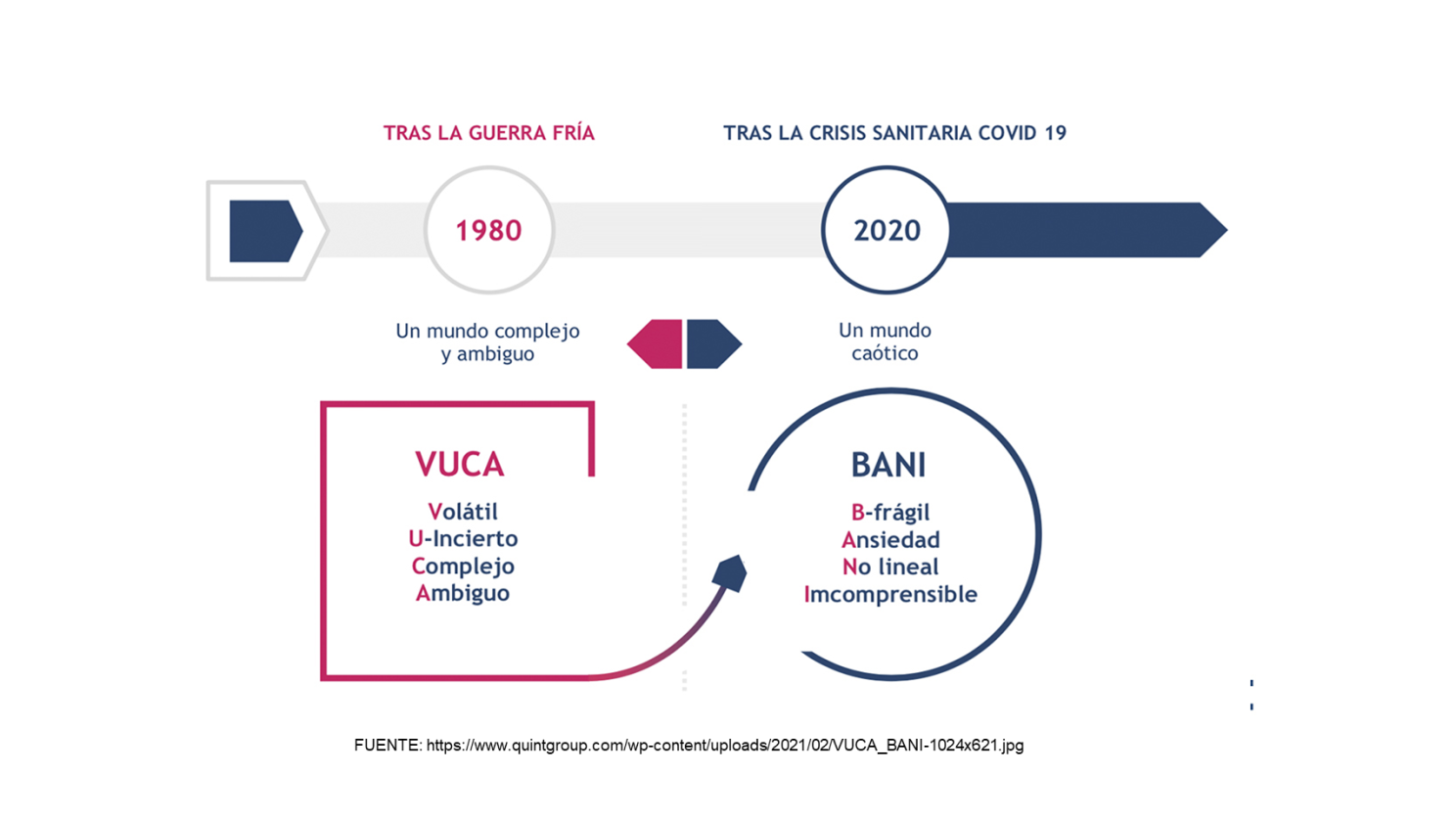From VUCA to BANI: the new global environment that is challenging your organization
The pandemic puts an end to the VUCA environment. Do you know the new environment we are facing?
Surely you have heard the VUCA concept to describe our current environment (volatile, uncertain, complex and ambiguous). This concept emerged at the end of the cold war and was later adopted by the corporate world and different authors of business strategy books.
While VUCA may still make sense to you when looking at our present, the truth is that Jamais Cascio, an American anthropologist and "futurist" , has proposed a new acronym that has been gaining momentum since the healthcare crisis: the BANI environment.
The BANI environment refers to a new global configuration, which is defined by being:
- Brittle (Brittle)
- Anxious (Anxious)
- Non-linear (Non-linear)
- Incomprehensible (Incomprehensible)
In this new BANI environment, "conditions are not just unstable, they are chaotic" - Cascio (2018).
This is how the VUCA concept has become obsolete. For example, if we ask ourselves the question "How will the pandemic continue to affect us? We will realize that volatility, uncertainty, complexity and ambiguity are concepts that are no longer sufficient to generate a greater understanding of the problem and therefore, how to act in the face of it.
BANI has thus emerged as a new navigation chart to understand the big picture in this era of chaos, generating new guidelines for action in the face of the unpredictable and incomprehensible.

But what are BANI's challenges?
Let's review the characteristics of its 4 elements:
Brittle (Brittle)
- Fragility in all areas, which implies a greater likelihood of making mistakes.
- Better adaptation of those with a "fail fast, fail cheap" mentality.
- Classic examples such as the downfall of blockbusters for not "adapting" to changes will probably become more and more common.
The risk is to become paralyzed in the face of fragility.
The challenge is to learn to iterate quickly, to be able to change on the move.
Anxious (Anxious)
- Levels of uncertainty that impede decision making and agreement generation
- Infoxication (excess of information),
- Sense of threat, vulnerability, disorientation
The risk is in normalizing discomfort and making it part of the organization's culture.
The challenge is to generate tailored wellness policies and strategies to increase the feeling of closeness and connection in the teams.
Non-linear
- Cause-effect explanation is insufficient. Multicausality and multiple effects in different systems simultaneously.
- We seek to act at all levels at the same time, with the same speed and effectiveness.
- Frustration is generated by feeling that progress is being made and then going backwards again, maintaining a logic of linear thinking.
The risk is to work in isolation, without generating high-performance teams that can add value through collective intelligence.
The challenge is to prioritize with flexibility, plan with a focus on adaptation and constant adjustment, integrating learning quickly.
Incomprehensible (Incomprehensible)
- Goodbye to the same formulas, solutions and recipes of the past.
- Data and information will be useful to the extent that strategic foresight skills are developed.
- It is recommended to plan the objectives based on various scenarios, evaluating their effectiveness in the short term.
The risk is the lack of a clear and mobilizing purpose. A clear and shared purpose facilitates the generation of meaning.
The challenge is to have open and transparent information systems that facilitate collaborative and networked work.
"The current environment has shown us that change comes fast and without warning, that it is rather part of the day to day and typical of a BANI environment" - Gabriela Prado. Founder of The Change Lab
We know that this new scenario sounds not very encouraging, and at The Change Lab we are convinced that this change of environment generates new levels of complexity in organizations and projects, especially for those who must lead and manage change in the midst of this scenario.
Therefore, we invite you to learn all the details of our Applied Change Management Certification program, in which we have certified more than 200 professionals throughout Latin America who are leading processes of transformation and change in their organizations.
That is why we invite you to review the information of our International Certification in Change Managementaccredited by the Association of Change Management Professionals, in which we have certified more than 200 professionals throughout Latin America who are leading processes of transformation and change in their organizations, now about to start its next version.
You can also SCHEDULE a time to discuss and apply directly by meeting with the Program Facilitator.
About the Author of this article:

Francesca Costa is a Consultant at The Change Lab. Psychologist and Master in Organizational Psychology at Universidad Adolfo Ibañez. Certified ICF Coach. Founder of Confluend, the #1 marketplace for consulting with social impact.